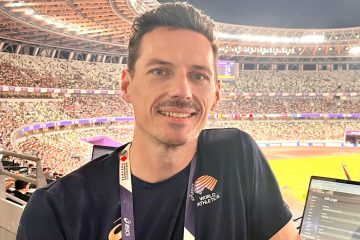21 Questions With… Jack Murley
It’s the second installment of our new series of interviews with those in sports media who are LGBT+. Next up, it’s broadcaster Jack Murley…
Our Q&A feature kicked off at the end of July, with the Daily Cannon editor Lee Hurley telling us all about his work as an Arsenal fan site editor and freelance writer, what’s it like to live in Belfast as a trans man, and his admiration for Martina Navratilova.
Now, as we continue to learn more about some of the people who make up the Sports Media LGBT+ network, it’s time to ask 21 Questions of a man breaking new ground in BBC radio…
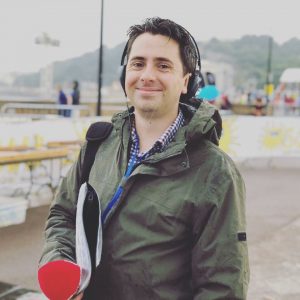
Jack Murley is a sports broadcast journalist who lives on Jersey, where he works for the BBC in the Channel Islands. As well as contributing to the sports output in various ways throughout the week, he’s the presenter and producer of the local network’s Sportscene show on Saturday afternoons and in July, he launched a new digital radio series called ‘The Other Side’, focusing on LGBTQ-related stories from across the world of sport.
So far for the series, at the time of writing, Jack’s spoken to football referee Ryan Atkin; the founder of the Kings Cross Steelers, Lord Robert Hayward; gold medal-winning diver Matthew Mitcham; Jim Hearson of London Titans FC; Out To Swim’s Vicki Carter; the chair of International Gay Rugby, Ben Owen; Aurelie Charles of the London Remnants Hockey Club; wrestler Jack Sexsmith; motor racing driver Charlie Martin; and golf coach Alison Perkins. It’s a hugely impressive set of interviews, collated in less than a month, and really showcases a wide range of personalities in sport who are LGBT – professional and grassroots – and their fascinating stories.
[Editor’s note (25.9.18) – ‘The Other Side’ is now the BBC LGBT Sport Podcast! Subscribe now on iTunes… congratulations Jack!]
So without further ado, let’s learn more about Jack himself…
1. What does a typical day look like in your job?
It’s a cliché, but no two days are the same. News breaks, and so too do the plans you may have set for yourself at the start of the morning – and in a way, that’s what I love about the job.
Broadly speaking, I get into the office at about 8am and have a quick flick through the back pages and the sports wires, to see what’s happening locally and nationally. While the office is relatively quiet, I’ll spend some time editing interviews I’ve collected the previous day, getting them ready for broadcast on whatever show we’ve decided they’ll go on.
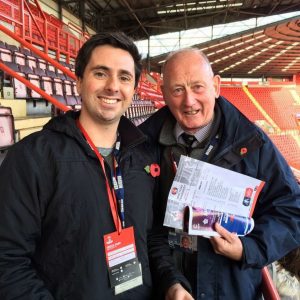
The first major meeting of the day is the 9.30am editorial conference, when we’ll discuss and decide what sports stories across the region need pursuing, and how we’ll do it. I’ll pitch sports stories and weigh in on others that people in the team may want to chase – and between us, we’ll decide on how and when we want to do them. Sometimes, they’ll only warrant a line of copy in bulletins, and on others, it’ll be a multi-platform affair with multiple shows requiring multiple pieces, along with additional reports for television and online.
The rest of the day will be spent working and delivering those stories – but, as I also present the Saturday Sportscene show, I’ll also be putting in calls to set up interviews and recordings for that four-hour block of programming. I’ll also be sorting the administrative side of the job – checking technical requirements for commentaries, booking ISDN lines, arranging freelancers – and uploading fresh content to the Sportscene website, as we’re trying to improve and enhance our digital profile.
On an average day, that’ll see me through until about 6.30pm – but more often than not, there are recordings to go to in the evening. After all, that’s when a lot of clubs practice or are available for interviews – so if you want to get to the good stories, you have to work around the schedule of your local teams and athletes. That can add a couple of hours on to the end of the day – and when the rugby and football seasons have started, at least a couple of evenings a week are spent preparing commentary notes for whichever club the Jersey Reds, the Guernsey Raiders or Guernsey FC happen to be playing, so I’m ready for that come Saturday.
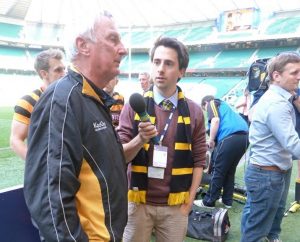
2. What’s the most enjoyable aspect of your work?
To pick just one is really difficult – because anyone doing my job is going to struggle not to enjoy it. I’ve been lucky enough to report from the touchline at Twickenham and interview some of my heroes – things that, in a million years, I’d never have thought possible. But if I’m being honest, what I love the most is having the freedom to tell stories. When I’m commentating, it comes in the rare moments where you find the words that sum up the emotion of what you’re watching, like a club winning promotion or an athlete finally getting the gold medal they’ve been working toward. When I’m reporting or producing, it’s the moment you get that golden quote from an interviewee, or find the statistic you need to anchor a great story on. I still get the buzz now, when I’m speaking to someone and they give me the sentence that sums up the whole piece – it just doesn’t get old!
3. What’s your favourite sporting memory?
Manchester United beating Bayern Munich in the Champions League final in 1999. As a kid, I can remember the way hearing the competition’s theme music on a Wednesday night used to make me feel. I can remember sitting with my grandad and watching the group games; and then being with my dad in the lounge as the final was played (my mum always got too nervous to watch). I can still hear Clive Tyldesley’s commentary – ‘can Manchester United score? They always score … name on the trophy! … and Solskjaer has won it! …’ – and my dad jumping off the sofa when the winner went in. I’m not even a Manchester United fan, but that was special.
4. Who are your top three icons in sport …
Billie Jean King, Usain Bolt and Ronda Rousey.
5. … and why?
Billie Jean King for what she accomplished on the court, but also what she sacrificed off it to pave the way for the women who followed her; Bolt, because when you watched him race at the peak of his powers, you just knew you were watching history unfold; and Rousey, for single-handedly creating the conditions where the UFC had no choice but to let women fight in the Octagon, and not only fight but headline pay-per-views and show they were every bit as capable of selling out arenas as men.
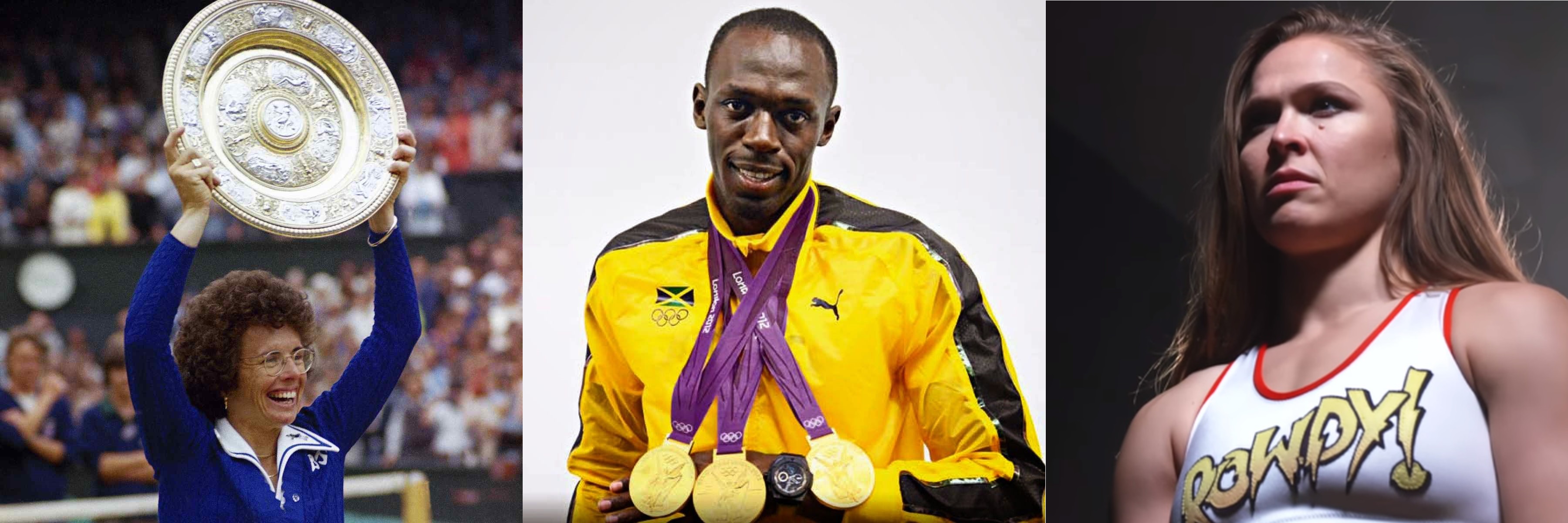
6. What made you want to pursue a career in media?
It’d be a lie if I said I always knew I wanted to do this. When I was a kid, I used to play in goal during kickabouts at the park and commentate on what was happening in front of me. Then I went to university to do a completely unrelated course, graduated with no idea of what I wanted to do, and fell into doing volunteering at a local radio station. I was then fortunate enough to get some work experience at BBC Radio Cornwall – and from the moment I went through the door of the newsroom, I was hooked.
7. Which people and personalities do you look up to in the industry?
As a presenter, I think Mark Chapman is as good as anyone you’ll find anywhere at the moment – warm, funny, unbiased and the type of person you just want to stay listening to. As an interviewer, if I could ever be half as good as Kirsty Young is on Desert Island Discs, I’d be a happy man – and when it comes to commentaries, few can measure up the quiet authority and descriptive clarity that John Murray brings to a microphone. I also have to mention a wrestling commentator called Jim Ross – and yes, while wrestling isn’t a ‘sport’, his passion, turn of phrase and ability to tell a story are something I try to apply to my own commentaries.
8. What advice would you give to someone who wants to follow in your footsteps?
Opportunities can be really hard to come by in this industry – so if you get one, make sure you make the most of it. Do your research on whatever you’re sent to cover, know about the teams who are playing, and make sure you get to the location in plenty of time to account for technical issues cropping up with your equipment (because usually, there will be at least one or two you have to deal with!) And if you’re already in a newsroom environment, never be afraid to ask for help. We’ve all been in situations where we’re confused by what’s being asked of us, or need a bit of support – so never be afraid to speak up if you’re feeling unsure of something.
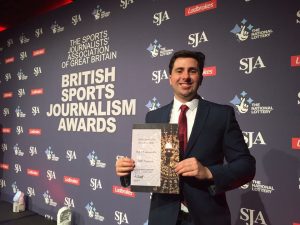
9. What’s your stand-out moment from your media career to date?
I’ve been really fortunate in what I’ve been able to do so far, but for me, it’d have to be earning a ‘Highly Commended’ at the British Sports Journalism Awards for my coverage of Yeovil Town Ladies with BBC Somerset. It was a labour of love by myself, Charlie Taylor and Alex O’Loughlin – who worked for free and in our own time to make sure the Ladies’ team were given the same degree of coverage as the men for their promotion-winning season in the WSL. To see that recognised alongside BBC Radio 5 Live’s coverage of the Rio Olympics was pretty special.
10. What aspect of working in the industry have you found most difficult?
For me, it’s the uncertainty when you first start out. I never enjoyed freelancing – and when you’re not certain of when or where your next shift will be, I found things pretty stressful. Then again, lots of people love the freedom it brings – so maybe that’s just me!
11. How do you try to have a healthy work-life balance?
I’m afraid I’m the wrong person to ask about this as, to be honest, I’m pretty rubbish at it. I do a lot of recording and work in my own time – but I make sure I play badminton twice a week, swim and run a bit as well, and try not to check my emails while I’m doing it. But frankly, I’ve not quite got the hang of getting the balance right yet!
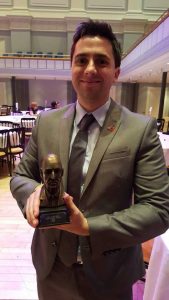
12. How, if at all, does being LGBT+ have an effect on your working life?
I suppose I’ve always thought that, in my life and my work, it’s easiest to just be honest – and that includes the way I talk about myself on-air. Frankly, it’s not something that comes up a lot in my current role – but in my old job (I used to host a daily three-hour phone-in at BBC Somerset), when we were talking about relationships or love or something like that, I always spoke about my ‘boyfriend’, rather than my ‘other half’ or ‘partner’ or something that felt like I was holding part of me back. Also, you’re often asking people to phone in to talk about deeply personal things in their own life, so I felt the least I could do was be honest about my own – and in this day and age, who you’re attracted to shouldn’t be that big a deal.
Did it cause issues? At times, yes – you get the nasty texts and emails and the like. But broadly, people didn’t actually care that much – and it also opened up the show to new conversations and topics that weren’t being spoken about otherwise. For example, me being honest about who I was encouraged a trans-woman in her 70s to phone and tell us her story – something she explicitly said she wouldn’t have done had I not spoken honestly about who I was.
13. What workplace inclusion initiatives, if any, have encouraged you during your time in employment?
To be honest, during my eight years with the BBC, I’ve not seen many for LGBTQ+ employees. Now, that doesn’t mean they’re not there – it’s just that I’ve not seen a huge amount. However, I’d also say that, in both my current job and my previous one, if I’ve told a management team I want to do a piece on something of relevance to the LGBTQ+ community, they’ve given me their full backing. At BBC Somerset, that was an hour-long documentary on a rural mining town’s first Pride, and at the BBC in the Channel Islands, that’s been the launch of ‘The Other Side’ – the BBC’s first-ever dedicated series looking at LGBTQ+ issues in sport.
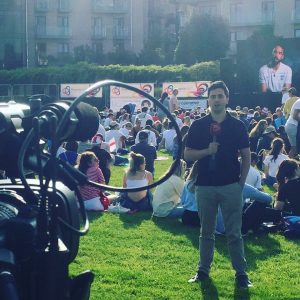
14. As an industry, how would you assess the media/ sports media on its efforts towards inclusion?
Frankly, it’s hard to know where we stand. With things like gender or ethnicity, it’s very easy to get a feel on whether things are getting more inclusive in terms of pundits, commentators, etc – but for LGBT+ diversity, I think it’s harder. I would say it’s disappointing that, in 2018, so many big events (The Gay Games, The Bingham Cup, etc) aren’t getting more attention from mainstream media, which is another reason why we’ve started ‘The Other Side’ show, to start telling some of those stories.
15. In your local community or region, what evidence do you see of social attitudes towards LGBTQ+ people, whether positive or negative?
A tricky one to answer, given the fact that, when I moved into my new role, the issue of same-sex marriage was making a lot of news locally. I suppose I can only speak personally and say that, in 2018, I have been surprised by the amount of intolerant language and views I’ve heard expressed – but that I’ve also seen many, many people coming forward to call those views out and give their backing to the LGBTQ+ community.
16. What positive signs do you see that sport is becoming more welcoming to lesbian, gay, bisexual and transgender people?
I think there’s a lot of positives, not just in sport but around it. You’ve got top-level clubs and athletes getting involved in the Rainbow Laces campaign; you’ve got two openly gay athletes (Amanda Nunes and Raquel Pennington) fighting each other for the UFC’s Women’s Bantamweight Championship; you’ve got more and more inclusive clubs being started; and you’ve got companies like Paddy Power donating to Attitude magazine during the 2018 World Cup. Is there a distance to go? Sure – and we’re nowhere near where we need to be yet – but I don’t think anyone can deny we’re heading in the right direction.
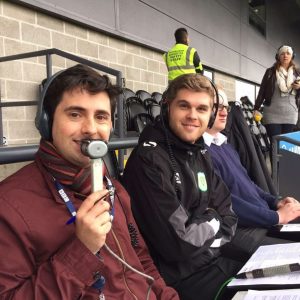
17. How can sport, whether at professional or grassroots levels, make progress on LGBT+ inclusion?
I’m not sure I’m the best person to give an overview of this, so I’ll simply mention something from experience when I was growing up. As a kid playing hockey, one thing that made me feel uncomfortable was when I’d hear ‘gay’ thrown about as an insult in a match. Now, I don’t believe for a minute that the people I was playing with were or are homophobic in any way – in fact, they were a great bunch of people.
But when you’re 14 or 15, trying to figure stuff out in your own head, and using sport as a way to escape from some of that confusion, hearing language like that wasn’t always easy. So, for me, it would be grassroots clubs not assuming that everyone who is playing for them is heterosexual or cisgender, and to remember that words can and do matter.
18. Whose stories have had the greatest impact on you, in terms of LGBT+ representation in sport?
This is a little bit left-field, but I’m going to mention a superstar from the professional wrestling industry named Finn Balor. I’m a huge WWE fan, and he’s one of the biggest stars in the game – and this year, he walked out to perform at WrestleMania wearing a custom-made Pride jacket. To see this young, cool, fan favourite get a huge cheer for representing the LGBT+ community was so unexpected, and so brilliant, that I had to rewind and watch it two or three times, over and over again. It may not have made much of an impact on anyone else, but for me, that was special, and something I never thought I’d see.
https://www.instagram.com/p/Bhb6dCsn5GX
19. What’s your recommendation for… a movie or TV show?
Summer Heights High. If you’ve not seen it, go out of your way to find it. It’s a spoof documentary series on life in an Australian school – and it manages to be both laugh-out-loud funny and poignant at the same time. It was only one series – but it is amazing.
20. … a book?
I’m more of an MMA fan, but I do have a weakness for books on boxing. ‘The Fight’ by Norman Mailer is brilliant at describing Muhammed Ali and everything that made him special, as is ‘King of the World’ by David Remnick. I also loved Donald McRae’s ‘A Man’s World’ – about gay boxer Emile Griffiths – and Elliot Worsell’s ‘Dog Rounds’ is a book I picked up a couple of months ago and then couldn’t put down.
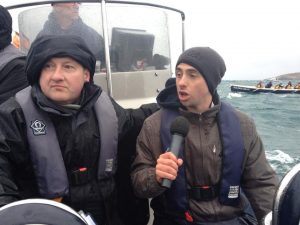
21. … a destination (travel, event etc)?
The Isles of Scilly during the World Pilot Gig Championships. For about six years, I’ve been covering this event for the BBC – and I reckon it’s one of the best-kept secrets in sport. A beautiful part of the world in my homeland of Cornwall, it hosts thousands of rowers from across the globe at the start of May for three days of competition. The camaraderie, the scenery, the racing – honestly, it’s brilliant!
Huge thanks to Jack – follow him on Twitter at @jack_murley, and be sure to listen to the BBC LGBT Sport Podcast. You can still access past episodes of ‘The Other Side’ too.
Interested in participating in our ’21 Questions With…’ feature? Or just keen to learn more about our network? Drop us an email at info@sportsmedialgbt.com – we’d love to hear from you.
